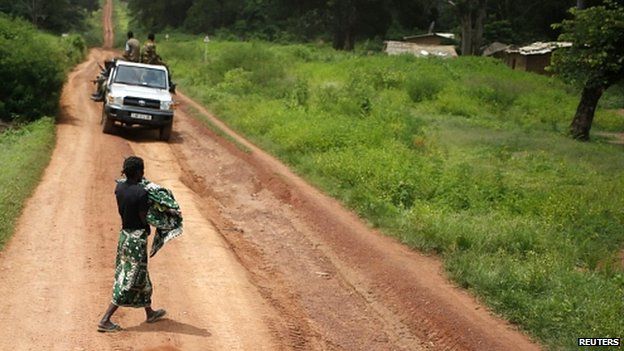Central African Republic crisis: Silent majority held hostage
- Published
- comments

Travelling into the countryside of the Central African Republic around Bambari is an unpredictable business at the best of times. Two punctures on the rutted dirt track delayed our first attempt.
We limped back to a tyre-repair shop in the town's dilapidated Muslim quarter, close to the spot where a suspected Christian fighter had been hacked to death by a mob.
Two hours later we tried again, only to learn of an apparent ambush near a checkpoint on the edge of town.
Rumours rattled around. Christian anti-balaka militias had killed two Seleka fighters. Or maybe someone had just fired warning shots in the air. Everyone is constantly on edge here.
Eventually we set off.
The first abandoned village emerged from the trees after 11km (6.8 miles). More than 100 mud-brick homes newly burned - their thatched roofs now lying in ashes in the dirt. Not a soul in sight.
In front of us was a white vehicle with a ragged flag that showed it belonged to the organisation Medecins Sans Frontieres (MSF).
Robert Pension - a reassuringly cheerful Dutch doctor - was on his own exploratory mission to see if there were any new casualties along the road, and to offer more general medical support to any village that seemed to have come back to life.
Thirty-four kilometres from Bambari - my tourist map said we had driven past a site of ancient rock art and a scenic view - we found a crowd of civilians gathered under a tree in the village of Ngalua.
They had been hiding in the forest for weeks, but had just returned and were busy mourning the death of a 22-year-old man called Gilbert Mbetindje.
He and two colleagues had been deep in the forest tending to their peanut fields, when a large group of Muslim cattle-herders had seized them, and killed Mr Mbetindje with three bullets.
In the past, the ethnic Peul cattle-herders have co-existed, relatively peacefully, with the Christian farming communities here, but the wider conflict in CAR has drawn both groups into a furious cycle of raids and reprisals.
"There were about 75 of them - Peul as well as two Seleka fighters. They tied us up. Look you can see where they cut us with machetes," said Lucien Santiago, 26, showing me two wounds on his back.
He said the group was hunting for anti-balaka fighters who had attacked their cattle camp a few days earlier.
Burnt villages
Dr Pension addressed the crowd, telling them that he would be back in five days' time with a mobile clinic, mosquito nets and malaria medicine for the younger children.
"The level of violence is mounting. On the roads leading out of Bambari we find six, seven, eight villages being burned. Almost every day we hear of new villages being burned," Dr Pension told me.
It is hard to discern any strategy or pattern behind the violence.
In the absence of any central authority in the country, the anarchy simply ebbs and flows as one incident provokes retaliation elsewhere, and armed gangs increasingly look to support themselves by banditry.
Laurent Kossilihou, the chief of another, larger village called Batobadja, told me that some 4,000 inhabitants had just emerged from a week hiding in the forest.
They were hungry and many children were suffering from diarrhoea.
A crowd gathered round our vehicles, anxious to talk - to ask for news about the wider conflict and for help.
What struck me in Batobadja was the absence of any anti-balaka fighters.
We had run into half a dozen makeshift roadblocks elsewhere, and been asked - with varying degrees of forcefulness - for money or cigarettes.
Hot-headed youths
Mr Kossilihou was a soft-spoken man, who had been elected chief by the village for a five-year term.
He stressed, repeatedly, that there were no anti-balaka in his village.
I asked him why not - given that the militia I had met elsewhere insisted they were helping defend the local population - and Mr Kossilihou looked nervously around him and avoided answering.
It struck me - not for the first time in CAR - that here was a civilian population being held hostage, not only by external enemies but also by those who claimed to be protecting the community.
And therein lies both the challenge facing this utterly failed state, and a path towards its recovery.
At one level CAR's future may be determined by presidents, generals, foreign peacekeepers and neighbouring nations, UN resolutions and ceasefire talks.
But in the forests beyond Bambari such things have never counted for all that much.
Here, where the tall trees loom over the dark dirt tracks, the only power struggle that counts is the one between Mr Kossilihou and the silent majority he represents and the hot-headed youths manning the roadblocks and itching for another slice of revenge.
Read Andrew Harding's previous reports from his trip in CAR: